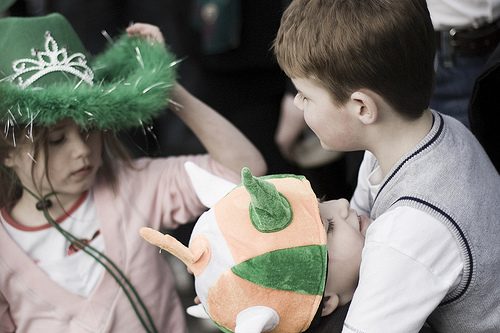A lot is said and written about photography and the law – and to be honest, you’d be mad to get involved in the fray. Of course, I am that mad, which is why the Rights vs Respect in Photography ended up published here on the site.
Now, the other day, one of my readers, Brad, posted a rather fantastic and soberingly clear comment about what the law actually means to photographers. It was written from an US point of view, but frankly, the law is similar in much of the world. Beyond the law, however, you should be looking for a helping of ‘common sense’. This ‘common sense’ thing isn’t as common as its name would indicate, so hereby; a healthy dose of common sense and a quick refresher of what you can and can’t do when you’re out and about with your camera…
I was so happy to find this in my comments, that I figured it’d be a crying shame if it stayed hidden away as a comment on a long-forgotten blog post, so hereby, republished in all its glory. That means that some of the comments (where they are replying to other comments) are a little out of context, but I’ve linked directly to the correct comment where possible, to clarify.
Take it away Brad:
The law can essentially be summed up like this:
1. You can take a picture of anything you see – especially when you are in public.
2. You CANNOT take pictures where there is an expectation of privacy such as in a rest room or locker room. (more about Expectation on Privacy on Wikipedia)
 3. You cannot legally trespass, but if you are on a side walk and you were so inclined you can photograph people in their back yards or on their porch. I think the back yard is over the line though.
3. You cannot legally trespass, but if you are on a side walk and you were so inclined you can photograph people in their back yards or on their porch. I think the back yard is over the line though.
4. You can take pictures of people or children in any public context. BUT DON’T FOLLOW LITTLE KIDS OR YOUNG WOMEN AROUND AND SCARE THEM. Legally though, you can follow people to get that shot – remember the Princess Diana chase. Perfectly legal.
5. You cannot profit from your work without signed releases. But to restate, feel free to snap away. It is only your commercial use that is limited.
6. You NEVER have to surrender your camera to or discuss the nature of your photography with anyone without a court order.
The photo with the guy wearing the ‘I ♥ Michelle Obama’ shirt is Me to, brother. Me too. by Photocritic.org, on Flickr. It was taken street-photography style without permission – but sits very nicely in my portfolio, which is perfectly legal.
Protecting your right to taking photos
I hate government oppression too. I was oppressed last summer at a pool. The Captain of the Guard approached me and asked me about the nature of my photography. I advised him that it was none of his concern as I was in a public place photographing what is in the public view. Furthermore, I told the “Captain of the Guard” to call the police expecting them to tell him there was nothing they could do about it. Without rehashing the whole story, the police can stay there and observe you. They may lie to you and try and intimidate you even making threats such as banning you from a public park (which they cannot do). Luckily, I happened to be on the phone with an attorney at the time. As an aside, you ARE required to provide police with valid ID if asked.
In a case like this, take pictures of the police officers, their badges and their cars. Indeed, take pictures of all the people involved and go public with it. Continue taking pictures of your original subjects. It is perfectly legal, they cannot prohibit it unless you are on a restricted government property or at a nuclear facility. You can also take as many pictures as you want of whatever and whomever you want including the person escorting you out of a private place(for example you are at a mall and being escorted out). If you are alone, get somebody on the speakerphone as a witness to what is being said.
Assault (fear of harm), Battery (physical contact), Terrorist Threats (threats of violence), vandalism (damage to your property) are serious offenses. If someone like an angry spouse or parent threatens you with harm or attempts to seize your equipment calmly offer them the opportunity to stand down and walk away. Suggest that they call the police or their attorney. If they do not stand down, call 911 and press charges.
How to avoid being photographed
For better or worse a person’s sole recourse is to seclude themselves should they wish to not be photographed.
So:
1. When you are in public, dress and behave appropriately or you may find your picture on MySpace or something similar. I don’t know what your son was doing when his ex photographed him, but if they are all appropriate the pictures may convey a different sense than the words the ex is using. Whatever the pictures convey however, is true for that moment in time.
2. Dress your young children appropriately even at the pool. They may be photographed. You CERTAINLY DO NOT want them to appear older or sexually appealing.
3. Encourage your teens to dress and behave appropriately. They may be photographed. Do NOT buy them clothes that you do not want them seen in.
4. Do NOT threaten or harass a photographer. You may find yourself in front of the magistrate if you do. You most certainly will if you threaten me.
5. Be conservative. Do NOT make yourself into an irresistible subject.
As for the lingerie store worker: The contents of the store are NOT copyrighted works. That is not what would prohibit this person from entering the store with a camera. Indeed, unless it is posted otherwise, he can walk into the store with his camera. He CAN be ordered to leave and must comply since it is PRIVATE property. He can enter in the first place by virtue of being a store open to the public. Permission to enter is implied. That is why your store my wish to post a prohibition notice against photography inside the store.
Now, if this is in a mall, mall security can escort him out. He can of course take as many photos of anyone or anything he wants while he is being escorted out of the store or mall.
If he is on the side walk outside the store unfortunately, you are out of luck. He does not need your coworker’s permission to photograph her.
Good photographers are ALWAYS looking for a good photo opportunity. That could be a beautiful woman, a handsome man, a child playing (some facial expressions are golden), an animal, sunset or barn. Who knows.
 Young Jealousy by Photocritic.org on Flickr – an example of a street photograph involving children. As I do not have model releases for them, I cannot sell it as stock, but (at least in the UK), I can use it in a newspaper article related to the event in which it was taken (St Patrick’s day parade), or I could post it on Flickr and use it as part of my photography portfolio.
Young Jealousy by Photocritic.org on Flickr – an example of a street photograph involving children. As I do not have model releases for them, I cannot sell it as stock, but (at least in the UK), I can use it in a newspaper article related to the event in which it was taken (St Patrick’s day parade), or I could post it on Flickr and use it as part of my photography portfolio.
I recommend getting your shot and moving on though. The longer you stay, the more likely you will be noticed.
I don’t know what this guy was doing at your store. If it was a one time thing hopefully he just found her an attractive subject, But admittedly, it sounds “creepy.”
There are times when I may sit or stand somewhere for more than an hour or two just taking pictures of people maybe trying to catch their expressions on an amusement park ride or a water slide. Little kids ooing at zoo animals and the like are awesome shots.
Advice, if someone is trying to seclude themselves from you (the photographer) such as moving to an area out of your view, though it may still be public, respect their privacy. If someone POLITELY asks you not to photograph them or their children you should respect that. If they are rude, screw them. Do what you want. NEVER FOLLOW A LITTLE KID AROUND.
Lastly, there is no expectation of privacy when you are in public. That is why I suggest being conservative. A “peacock” will almost always get its picture taken especially if it spreads its tail. If someone is taking your picture and you do not like it:
1. Politely ask them to stop 2. Leave if they won’t
Consult your attorney if you have any questions.
Brad
Closing notes
Please note:
This post was excerpted from a comment of the ‘Your Rights as a Photographer‘ post, and was republished as an alone-standing article with permission from the original poster.
Please note that nothing on this blog can be considered legal advice – if you have a query, please contact your attorney.





